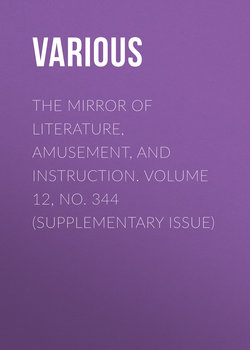The Mirror of Literature, Amusement, and Instruction. Volume 12, No. 344 (Supplementary Issue)

Реклама. ООО «ЛитРес», ИНН: 7719571260.
Оглавление
Various. The Mirror of Literature, Amusement, and Instruction. Volume 12, No. 344 (Supplementary Issue)
Ehrenbreitstein on Rhine
SPIRIT OF THE "ANNUALS."
The Musical Souvenir
The Keepsake
ON LOVE
THE OLD GENTLEMAN
THE VICTIM BRIDE
The Anniversary,
EDDERLINE'S SLEEP
THE SEA KING'S DEATH-SONG
Friendship's Offering
The Bijou
THE SLEEPERS
THE FEAST OF LIFE
The Winter's Wreath
THE LADY ANNE CARR,
Time's Telescope
THE INFLUENCE OF A FLOWER
The Christmas Box
Отрывок из книги
We have the pleasure of presenting to the readers of the MIRROR, the completion of our notices of these very elegant publications; and in pursuance of the plan of our former Supplement, we are enabled to assemble within the present sheet the characteristics of eight works, whilst our quotations include fourteen prose tales and sketches, and poetical pieces, of great merit.
The above engraving and its pendant are copied from the Literary Souvenir, specially noticed in our last Supplement. The original is a drawing by J.M.W. Turner, R.A. and the plate in the Souvenir is by J. Pye—both artists of high excellence in their respective departments:—
.....
Thou demandest what is Love. It is that powerful attraction towards all we conceive, or fear, or hope, beyond ourselves, when we find within our own thoughts the chasm of an insufficient void, and seek to awaken in all things that are, a community with what we experience within ourselves. If we reason we would be understood; if we imagine, we would that the airy children of our brain were born anew within another's; if we feel, we would that another's nerves should vibrate to our own, that the beams of their eyes should kindle at once, and mix and melt into our own; that lips of motionless ice should not reply to lips quivering and burning with the heart's best blood:—this is Love. This is the bond and the sanction which connects not only man with man, but with every thing which exists. We are born into the world, and there is something within us, which, from the instant that we live, more and more thirsts after its likeness. It is probably in correspondence with this law that the infant drains milk from the bosom of its mother; this propensity develops itself with the development of our nature. We dimly see within our intellectual nature, a miniature as it were of our entire self, yet deprived of all that we condemn or despise, the ideal prototype of every thing excellent and lovely that we are capable of conceiving as belonging to the nature of man. Not only the portrait of our external being, but an assemblage of the minutest particles of which our nature is composed: a mirror whose surface reflects only the forms of purity and brightness: a soul within our own soul that describes a circle around its proper Paradise, which pain and sorrow and evil dare not overleap. To this we eagerly refer all sensations, thirsting that they should resemble and correspond with it. The discovery of its antitype; the meeting with an understanding capable of clearly estimating our own; an imagination which should enter into and seize upon the subtle and delicate peculiarities which we have delighted to cherish and unfold in secret, with a frame, whose nerves, like the chords of two exquisite lyres, strung to the accompaniment of one delightful voice, vibrate with the vibrations of our own; and a combination of all these in such proportion as the type within demands: this is the invisible and unattainable point to which Love tends; and to attain which, it urges forth the powers of man to arrest the faintest shadow of that, without the possession of which, there is no rest or respite to the heart over which it rules. Hence in solitude, or that deserted state when we are surrounded by human beings, and yet they sympathize not with us; we love the flowers, the grass, the waters, and the sky. In the motion of the very leaves of Spring, in the blue air, there is then found a secret correspondence with our heart. There is eloquence in the tongueless wind, and a melody in the flowing brooks and the rustling of the reeds beside them, which, by their inconceivable relation to something within the soul, awaken the spirits to dances of breathless rapture, and bring tears of mysterious tenderness to the eyes, like the enthusiasm of patriotic success, or the voice of one beloved singing to you alone. Sterne says that if he were in a desert he would love some cypress. So soon as this want or power is dead, man becomes a living sepulchre of himself, and what yet survives is the mere husk of what once he was.
This and a fragment, with a character of Mr. Canning, by Sir James Mackintosh, are the transcendentals of the volume; as are the tale—The Half-brothers, by Mr. Banim, with an Ossian-like plate of the heroine; The Sisters of Albano, by Mrs. Shelley—Death of the Laird's Jock, by the author of Waverley—and Ferdinando Eboli, by Mrs. Shelley, with Adelinda, a plate, by Heath, on which we could feast our eyes for a full hour. Next, a sketch, by Theodore Hook, part of which will serve to vary our sheet:—
.....